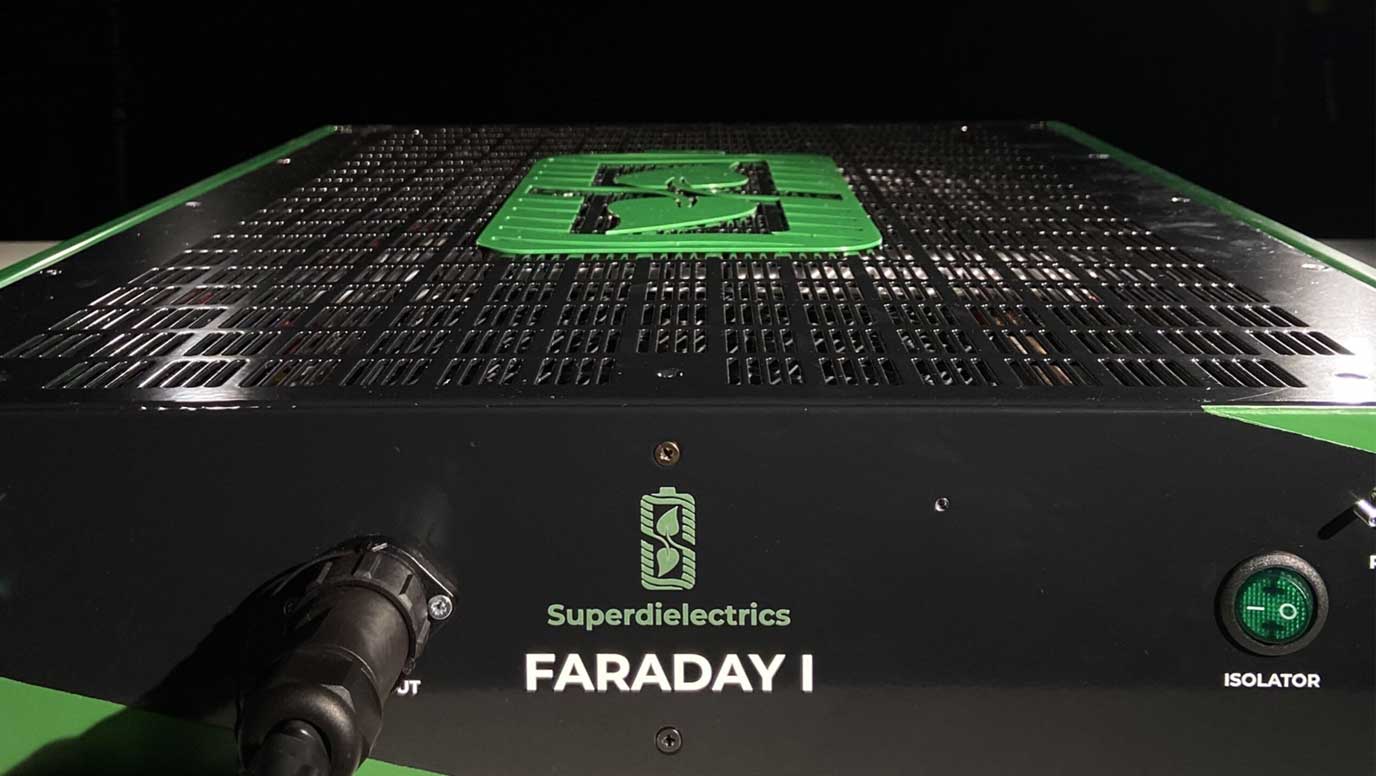In the footsteps of Faraday: Superdielectrics moves the dial on key technology

Superdielectrics’ energy storage technology combines electric fields (physics) and conventional chemical storage (chemistry) to create a new aqueous polymer-based energy storage technology.
The company – growing from its R & D base at Chesterford Research Park – has formally launched the Faraday 1, its state-of-the-art hybrid energy storage technology. CEO is Jim Heathcote, who formerly headed ITM Power.
The tech behind the Faraday 1 has completed over one million hours of testing to create a system that already has the ability to significantly outperform lead-acid batteries and has the potential, with further development, to match or better existing Lithium-ion batteries.
Such systems require economically viable energy storage. The energy storage market is currently dominated by lithium-ion and lead-acid batteries.
The company’s patented new polymer-based energy storage technology solves the issue of dealing with rapidly fluctuating and intermittent renewable energy which makes it difficult to currently store solar and wind energy economically.
Advantages are said to include:-
- Aqueous polymer-based technology that solves the issues of storing fluctuating and intermittent renewable energy.
- Highly efficient store of energy that charges over 10 times faster than lead-acid batteries with high cycle life.
- Safe store of energy – negligible fire risk.
- Low costs – it uses readily available abundant raw materials.
- Recyclable.
- Huge scale of addressable opportunity with $50 billion per year lead-acid battery market including electric scooter, forklift and off grid markets.
Heathcote said: “The team at Superdielectrics has worked incredibly hard to develop a ground-breaking technology that has the potential to revolutionise the energy storage market.
“Our breakthroughs deliver the potential, at last, to create the sustainable, global decentralised energy systems that the world desperately requires.
“The properties that our technology possess enables it to compete with and exceed current solutions in the energy storage arena across a number of key metrics whilst leading the way in sustainability, recyclability and affordability.
“This is a remarkable achievement by all concerned and we now look forward to commercialising our platform and products – we have seen global interest in our technology.”
Since moving into state of the art R & D facilities in Cambridge, Superdielectrics has significantly expanded its team – hiring world class international scientists and engineers.
Heathcote has worked in the energy storage technology field for over 20 years. He has received international awards for ‘Excellence in the Field of Environmental Technology Research’ on behalf of his companies.
In the field of hydrogen fuel cells and electrolysers he led ITM Power PLC, as Chief Executive, from a small start up to a public quoted company inside four years. In the 1990s, Heathcote founded the first European Hydrogen Economy Investment Fund.
Professor David Fermin, Head of the Bristol Electrochemistry and Solar Team and Net Zero Ambassador for the University of Bristol, worked with a team of Bristol engineers, examining the performance of prototype devices and unravelling the mechanisms involved in the storage and release of energy. He said: “It is a privilege to be part of the most exciting technology in the energy sector that I have seen involving our organisation.
“These state-of-the-art supercapacitors have the potential of becoming a game changer in energy storage. Superdielectrics’ devices are not only highly competitive against matured technologies in terms energy and power density, but are also free of critical elements, using earth abundant materials with lower environmental impact than other energy storage technologies.
“I can see Superdielectrics developing into a major player in this global market, providing safe and affordable sustainable energy for everyone.”
Senior Lecturer in Electrical and Electronic Engineering at Bristol, Dr Sam Williamson added: “Scalable and safe energy storage systems are required in challenging applications such as grid-balancing services and rapid charging for electric vehicles. The Superdielectrics technology can potentially play a role in these key aspects towards electrification of the energy sector.”
Professor Marcus Newborough, Director of R & D of Superdielectrics, concluded: “The combination of the benefits of rapid charging and sustainability used for energy storage now make it possible to create worldwide affordable and clean energy systems. In the future, the continuing development of our pure supercapacitor technology could surpass all existing battery technologies.”

